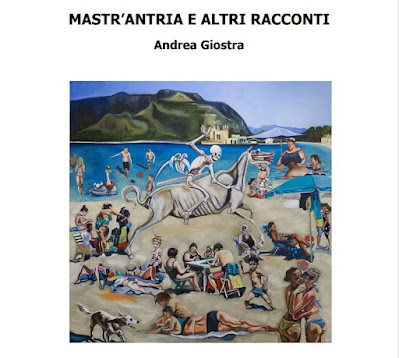Mastr'Antria and other stories – by Andrea Giostra
Review by Maria Teresa De Donato
With Mastr'Antria and other stories, Andrea Giostra
explores some themes and concepts expressed in his previous work Novelle
brevi di Sicilia (= Short Stories of Sicily).
In this sense, his new and unpublished literary work becomes the
flagship of modern and contemporary Sicilian literature and a true standing
ovation to his native land.
The beauties and riches of this stunning island, which boasts a millenary history,
culture, and traditions known and appreciated worldwide, are exalted and
brought to light in all their splendor.
The ongoing and slow flow of time, and the day-to-day life that becomes its heritage, uses, and
behavioral habits are carefully observed by the author and described in great
detail that lay bare its essence.
Generational behavioral changes are put under a magnifying lens and
scrutinized. From the generation of Mastr'Antria, or Grandpa Andrea, who
returned more or less immune from seven years of imprisonment in the
concentration camps in Sydney, Australia, where he was deported by the British
at the end of the Second World War and lived – according to him – quite well,
and didn't miss anything, we moved on to the era of nonsense, the loss of human
depth and an unprecedented weakening of character.
Difficulties once spurred past generations to reflection,
personal redemption, and, therefore, to growth, inner transformation, and,
finally, to survival, to the possibility of making one's way in the world.
Those generations are contrasted by one today, which, on the contrary,
perceives any problem, even the smallest, as an insuperable drama to be avoided
instead of an opportunity to grow, strengthen one's character, and learn to
relate to others and the circumstances as they arise.
The use of dialect is one of the fundamental aspects of this novel. Together with
the others already mentioned, it also becomes a tool for recovering and
disseminating tradition, one's culture, roots, and one's 'Sicilianity.'
The sense of sacredness, linked to spirituality or, in this case, to religiosity and,
above all, to life itself, is always present. It also becomes the dominant
factor from the beginning to the end of this work.
The culinary art of the family adds up to the cultural, artistic, and landscape
richness of Sicily, above all of Grandma Vita, whose recipes, respecting the
best and millenary tradition, have nothing to envy to those "of the
increasingly imitated nouvelle cuisine" (A Giostra, 2020, p. 101) and
its delicacies that are consumed in the "two hours of conditioned
socializing at Tribeca" (p. 102) essential to meet the people who
matter.
Mastr'Antria and other stories is not, however, only the novel of
Sicily, the recovery and enhancement of its culture, of its dialect, and the
enchantment that one feels towards this extraordinary land, nor only a sort of
diary in which the events described testify and immortalize the passage of time
and the lives of those who preceded us or that we lived ourselves. This work is
also, above all, a hymn to Love, to Sentimental
Relationships – whatever they are and regardless of how long they last or the
possibility or impossibility – on our part of feeling ourselves connected
psychologically, affectively, emotionally forever to another person. It is a
hymn to Eroticism in the purest and broadest sense of the term, to Passion
and Carnality lived spontaneously, without inhibitions, rules, fears,
prejudices, or false modesty, but in complete and total freedom, awareness,
abandonment, enthusiasm, and authenticity.
It is, even if in a veiled way, an encouragement to pay
attention to the everyday life that can ruin and even blow up the relationship,
transforming it from erotic and passionate into a simple, ordinary,
predictable, monotonous, and, therefore, boring routine.
The language, flowing and direct, is equally refined in style
and tone, sometimes melancholy, sometimes humorous, and occasionally comical;
it immerses the reader in the stories and dynamics of events by catapulting him
into a world which, however modern, seems to have preserved, more or less
intact, all the charm and splendor of its rich past.
I really appreciated a book that fascinated and transported me,
for its elegance and refinement, to the times of Il Gattopardo by
Giuseppe Tomasi from Lampedusa; which can be read in one breath and whose
reading – despite being intended for an adult audience – I am happy to recommend.

